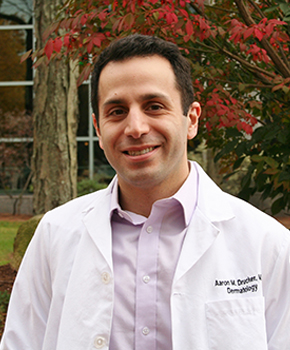
Aaron Drucker, MD
"My mentored research experience has been excellent, and it’s been really nicely complemented by the CTR Program course work, and the mentorship that you get through the School of Public Health.”
Starting in fall 2022, Brown will admit no new students to the CTR ScM program. The program will remain open until all enrolled students have graduated or completed their maximum time to graduate (i.e., five years from initial enrollment if enrolled full time). As with all degree programs at the Brown School of Public Health, the CTR ScM program is accredited by CEPH. The program will retain its accredited status.

"My mentored research experience has been excellent, and it’s been really nicely complemented by the CTR Program course work, and the mentorship that you get through the School of Public Health.”
The Master of Science in Clinical and Translational Research (CTR) is designed primarily for physicians, doctorally-trained basic scientists, and students in doctoral programs or medical school. The goal of the Master's in Clinical and Translational Research Program is to train clinicians and basic scientists to extend basic scientific research into the clinical arena, ultimately leading to improvements in individual and population health. By translating basic research into improved clinical outcomes, researchers and clinicians are able to provide new treatments to patients more efficiently and quickly.
Students in the Master of Science in Clinical and Translational Research program complete nine courses, including research methods, advanced research methods, scientific writing, biostatistics and applied data analysis, two electives, and a series of seminars, workshops, and mentoring sessions. Given the applied nature of the program, students work closely with advisors to develop a portfolio composed of a grant proposal, first author abstract submitted to a regional, national, or international conference, and first author research manuscript.
Students are required to successfully complete nine credit-bearing courses, attend mandatory seminar sessions throughout the program, and complete a thesis. Students are also required to complete the online, not for credit course, Public Health 1001. In addition to the Master’s in CTR core course requirements and the online course, students will choose two electives, and work with their academic advisor to design an educational plan that reflects their interests and career goals. Students are required to develop an academic portfolio, in which they should explore a topic of interest in clinical and translational research. Full-time students generally take 4.5 courses per year over two years. Coursework done for credit as a non-degree student may be counted toward the Masters in CTR degree with the approval of the CTR Masters Program Director.
Students in the Masters in Clinical and Translational Research program are required to complete the following core course requirements:
Students must take one of the following two courses:
Students must complete a year-long, two-course sequence in biostatistics/applied data analysis; this requirement can be fulfilled by taking one of two different course sequences:
Or:
Students must take two of the following advanced methods courses:
Students must enroll in the following two half-credit courses to fulfill the one-credit Scientific Writing requirement:
Students must enroll in this half-credit course two times to fulfill the one-credit requirement:
Students are expected to work closely with their academic advisor to determine the most appropriate electives for their individual educational plan and career goals. The following electives may be of interest for students in the M.S. in Clinical and Translational Research. All of these electives must be approved by each student’s academic advisor to ensure that the elective is appropriate for the individual student.
• PHP 1100 - Comparative Health Care Systems
• PHP 2019 - Measurement Issues in Health Care
• PHP 2060 - Qualitative Methods in Health Research
• PHP 2180 - Interpretation and Application of Epidemiology
• PHP 2200 -Intermediate Methods in Epidemiologic Research
• PHP 2220B - Nutritional Epidemiology
• PHP 2340 - Behavioral and Social Science Theory for Health Promotion
• PHP 2400 -The US Health Care System
• PHP 2440 - Pharmacoepidemiology
• PHP 2450 - Measuring and Improving the Quality of Health Care
• PHP2465A - Intro to Health Decision Analysis
• PHP2561/BIOL1555 - Informatics and Data Science for Health
• PHP 2980 - Graduate Independent Study and Thesis Research
• ENGN 2910G - Topics in Translational Research and Technology
Given the applied nature of the ScM Program, students will develop a portfolio to meet the following thesis requirements. These requirements are developmental in nature and should be completed throughout the student’s studies. Students will be encouraged to engage in interdisciplinary work. The thesis requirements will help to move students forward in their career in clinical and translational research. Each student should work with his/her advisor and reader to determine the best timing for completion of the following requirements. All thesis plans must be approved prior to beginning the project. All ScM students are required to complete a thesis, which will be composed of the following parts:
OR